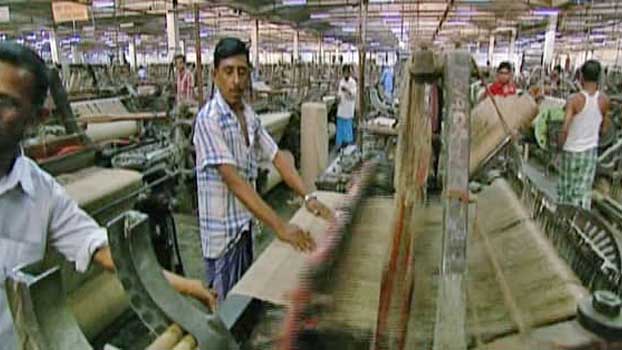Jute mill workers look for new jobs

Workers of 25 state-run, permanently-closed jute mills are worried about their future as they are not engaged in other jobs as yet. However, the government is paying their dues in phases.
“We are getting our dues. But the cash money will be spent quickly. When all our money is spent, what will we do?” a worker of Platinum Jubilee Jute Mill in Khalispur area of Khulna asked this reporter on Wednesday.
On the other hand, owners and employees of a large number of business establishments, shops and hotels across the industrial area in Khalishpur road, are passing inhuman lives as they are not getting customers due to the shutdown of the jute mills.
Meanwhile, the government will clear the dues of over 25,000 workers by next month. Earlier, the government shutdown 25 state-run jute mills with the assurance of payment of dues to the 25,000 workers.
The government closed down production of the mills taking into consideration their recurring losses and to help the enterprises breathe a new life by making them much stronger to compete in the international and local markets.
Earlier, the prime minister asked the concerned officials to formulate a work-plan to resume production at the jute mills by making them stronger and more efficient to compete in the local and international markets.
However, the decision to close the jute mills suddenly has disrupted the livelihoods of thousands of people in the sector. The workers have been unemployed for 10 months and their families are crying. Many are living with their wives and children without eating. They demanded the reopening of the jute mills.
Mohammad Kamal, a jute mill worker at the corner of gate number two of Platinum Jubilee Jute Mill in Khalishpur, Khulna, has worked as a transfer worker for 15 years. His experience of unemployment is old as the mills have been closed many times before. But this time, according to Kamal, unemployment has caused a catastrophe.
With a sigh, he said, "The mill has been closed since March 26 due to corona. Then it opened for a month in the middle. Then it totally shut down. I have not worked for about a year. How can I continue my life in such uncertainty?”
According to the locals of Khalishpur- after the closure of the jute mills, they left as usual. It can be said they had fled. Because, on the day of closure, Police, RAB, BGB took control of the whole area. Security was taken up in the colonies to stop the labor movement. Many workers left the area for fear of arrest. Again many sent their families to the villages. Since then, Khalishpur has become a ghost city.
According to the labor leaders, there are about 25,000 transfer workers in Khulna region alone. They are in deep uncertainty over the closure of the mills. Abdur Razzak Talukder, president of the Platinum Jute Mill Transfer Workers' Organization, said, "The government said the transferees will be paid after paying the dues of the permanent workers. If it is, we will get one and a half lakh taka. How many days will this money last? We want the jute mills to be restarted.”
According to the workers, none of those workers who retired after July 2013 has yet received their retirement pay. According to BJMC, the number of such workers is about 10,000.
Nurul Islam, adviser to the Pat Shilpo Roksha Jubojut, said, "There is collusion between BJMC officials and private jute mill owners. As a result, the government delayed buying jute during the season. On this occasion, private owners bought jute at low prices and filled the warehouses. Then BJMC bought rotten jute from private mill owners at higher prices on the pretext of jute crisis in the market.”
“Mainly the state-owned jute mills do not see the face of profit in the conspiracies related to old machines, the leaders of the ruling party, the CBA and the family syndicate of the Ministry of Jute and Textiles,” he added.
On condition of anonymity, a former BJMC chairman told this correspondent that the government's jute mill had sunk due to mismanagement. Corporate culture has not developed in BJMC as it is run by bureaucrats.
The irresponsibility of the officers was excessive. Although there were plans for production and marketing on paper, in reality there was nothing.



